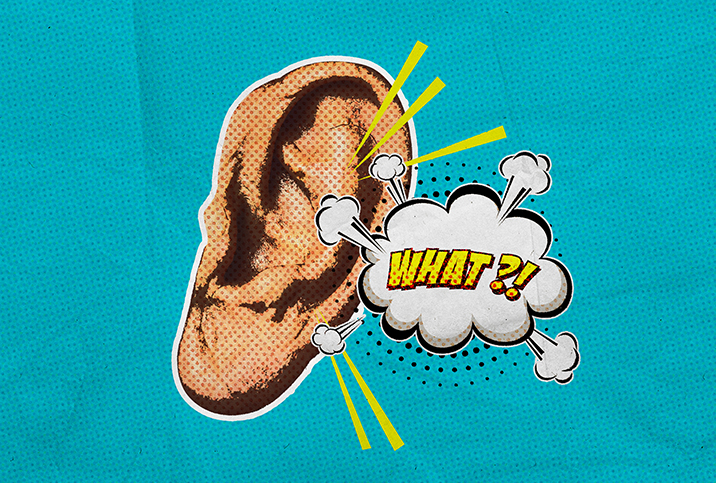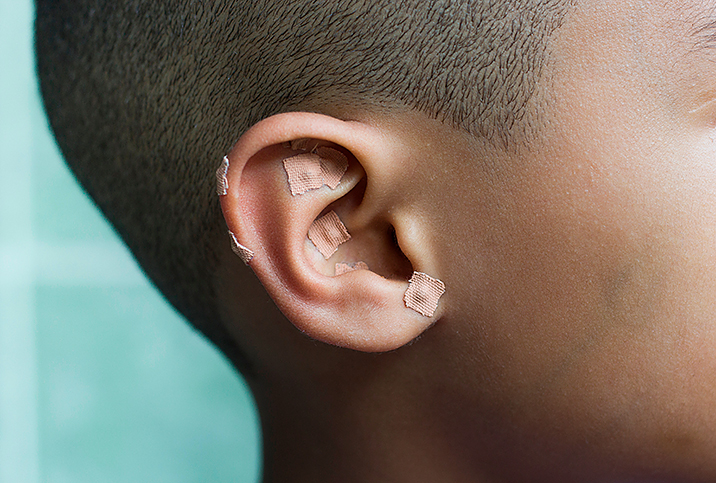How Your Hearing Changes as You Age

Presbycusis, better known as age-related hearing loss, tends to affect both ears equally and progresses gradually. That's why many people who experience this condition don't notice their hearing has changed until others around them begin to point it out.
"Because age-related hearing loss typically happens slowly over time, it can be hard to recognize when you're the one experiencing it," said Marquitta Merkison, Au.D., the associate director of audiology practices at the American Speech-Language-Hearing Association, headquartered in Rockville, Maryland. "It typically affects the high-pitch sounds first, and this results in a perception that people may not be speaking clearly, like they're mumbling. You might notice that you have a tendency to listen to the radio or the television at a louder level or that you have trouble hearing on the telephone. These are some common signs you can watch out for."
Although the early symptoms are minor and easy to ignore, it’s important to note that losing your hearing can lead to mental and emotional issues including anger, anxiety, depression, fatigue and social withdrawal. Within relationships, hearing loss can make day-to-day communications problematic, and that can lead to frustration, resentment and ultimately a sense of loneliness, isolation and a lack of intimacy.
You can protect yourself
Being able to recognize the warning signs of age-related hearing loss in yourself is useful because most people experience it at some point in their lives. In fact, the Hearing Loss Association of America reports one-third of adults in the United States between the ages of 65 and 74 have some degree of hearing loss, while about half of adults older than 75 say they have a difficult time hearing.
According to experts, presbycusis is usually caused by changes in the inner ear that occur naturally as you age. However, age-related hearing loss is sometimes caused by changes in the middle ear or in the nerve pathways that travel from the ear to the brain.
Genetic predisposition is known to play a significant role in whether you will experience presbycusis, though there's no foolproof way to predict what might happen to your hearing as you age, Merkison said.
"While there's no way to really predict what's going to happen to your hearing, you can look at your family tree to see what's the likelihood of you maybe having a genetic predisposition to losing it and at what age, and then you can talk to your doctor about that," Merkison explained. "And then there are other things that will impact your hearing over the course of your life expectancy and some of them are really controllable. So while presbycusis may be out of your control, you can still protect yourself against things like noise-induced hearing loss that comes from exposure to noises at a dangerous level. The best thing that we can all do is really think about and talk about our hearing and what the things are that we can control as we get older and as we all expect to live longer."
Don't ignore your hearing loss
While age-related hearing loss may seem to be no more than an inconvenience that can be solved by having people around you speak louder and turning up the volume on your devices, experts say prolonged hearing loss issues can lead to safety issues as well as mental and emotional problems.
"Hearing loss is a public health concern, especially as the population gets older," Merkison said. "When you have hearing loss and you don't treat it, you're more likely to experience depression, social isolation and anxiety. There's also research that shows that with untreated hearing loss, there's an increased risk of dementia and fatigue."
For many older adults, not being able to hear others around them can lead to frustration and embarrassment. Age-related hearing loss is often accompanied by symptoms such as tinnitus, which describes the sensation of ringing in the ears. Tinnitus has been found to affect quality of life because it can lead to stress and trouble sleeping or concentrating. Some clinical studies have found an association between tinnitus and sexual health problems such as erectile dysfunction (ED).
Cathy Trahan, a North Texas-based patient advocate and retired nurse, said individuals could begin to withdraw before they consciously realize hearing loss is affecting their lives.
"Not everyone likes the idea of getting old, and hearing loss is part of aging," Trahan said.
"Often, an individual may find themselves in denial, disagreeing when a family member points out that they didn't hear what was said," she continued. "Because conversations are a give-and-take process, if the individual has trouble talking, they will have trouble giving to the conversation. This can lead to avoidance of interactions altogether. As a result of that avoidance, cognitive abilities can begin to decline as the brain is not being stimulated and exercised."
When the root issue of hearing loss is ignored, Trahan added, you can start to feel like you're being ignored or that you don't matter as much anymore because you're getting older.
"Individuals may begin to feel insecure and afraid to respond to others for fear that what they say will reveal to others that they can't accurately hear what was said," Trahan said. "Then they start to draw in farther. The person can feel great embarrassment over hearing loss and be ashamed for others to know. So instead of asking someone to repeat what was said, they just shake their heads in agreement."
Periodic testing works
Having open and honest conversations about the physical changes that come along with aging is important. Trahan said she tries to make sure every patient knows hearing loss is extremely common for older adults and can be easily addressed. Most importantly, she said they should not be ashamed of it.
Merkison recommended senior citizens get a hearing test periodically so they can detect any hearing loss as it happens and treat it early. Age-related hearing loss can't be reversed, but hearing can be dramatically improved with hearing aids. Cochlear implants are an option for individuals with more significant hearing loss. Based on your hearing test, your audiologist can help you pick the option that's best for you.
"We want to be sure that the rest of society gets to benefit from the wisdom and the stories and the experience that our older patients and family members have to offer and that they're not withdrawn because they're not hearing very well," Merkison said. "It's important for patients to have their hearing tested by a licensed, certified audiologist so that a professional can go over what their hearing loss looks like, find out what their listening demands are and then work with them to help select an appropriate option that's going to address what they need."


















